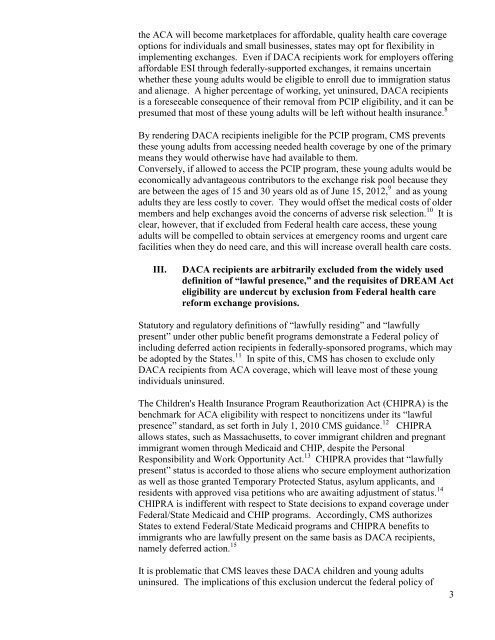HLA submits comments to the Centers for Medicare & Medicaid ...
HLA submits comments to the Centers for Medicare & Medicaid ...
HLA submits comments to the Centers for Medicare & Medicaid ...
You also want an ePaper? Increase the reach of your titles
YUMPU automatically turns print PDFs into web optimized ePapers that Google loves.
<strong>the</strong> ACA will become marketplaces <strong>for</strong> af<strong>for</strong>dable, quality health care coverage<br />
options <strong>for</strong> individuals and small businesses, states may opt <strong>for</strong> flexibility in<br />
implementing exchanges. Even if DACA recipients work <strong>for</strong> employers offering<br />
af<strong>for</strong>dable ESI through federally-supported exchanges, it remains uncertain<br />
whe<strong>the</strong>r <strong>the</strong>se young adults would be eligible <strong>to</strong> enroll due <strong>to</strong> immigration status<br />
and alienage. A higher percentage of working, yet uninsured, DACA recipients<br />
is a <strong>for</strong>eseeable consequence of <strong>the</strong>ir removal from PCIP eligibility, and it can be<br />
presumed that most of <strong>the</strong>se young adults will be left without health insurance. 8<br />
By rendering DACA recipients ineligible <strong>for</strong> <strong>the</strong> PCIP program, CMS prevents<br />
<strong>the</strong>se young adults from accessing needed health coverage by one of <strong>the</strong> primary<br />
means <strong>the</strong>y would o<strong>the</strong>rwise have had available <strong>to</strong> <strong>the</strong>m.<br />
Conversely, if allowed <strong>to</strong> access <strong>the</strong> PCIP program, <strong>the</strong>se young adults would be<br />
economically advantageous contribu<strong>to</strong>rs <strong>to</strong> <strong>the</strong> exchange risk pool because <strong>the</strong>y<br />
are between <strong>the</strong> ages of 15 and 30 years old as of June 15, 2012, 9 and as young<br />
adults <strong>the</strong>y are less costly <strong>to</strong> cover. They would offset <strong>the</strong> medical costs of older<br />
members and help exchanges avoid <strong>the</strong> concerns of adverse risk selection. 10 It is<br />
clear, however, that if excluded from Federal health care access, <strong>the</strong>se young<br />
adults will be compelled <strong>to</strong> obtain services at emergency rooms and urgent care<br />
facilities when <strong>the</strong>y do need care, and this will increase overall health care costs.<br />
III.<br />
DACA recipients are arbitrarily excluded from <strong>the</strong> widely used<br />
definition of “lawful presence,” and <strong>the</strong> requisites of DREAM Act<br />
eligibility are undercut by exclusion from Federal health care<br />
re<strong>for</strong>m exchange provisions.<br />
Statu<strong>to</strong>ry and regula<strong>to</strong>ry definitions of “lawfully residing” and “lawfully<br />
present” under o<strong>the</strong>r public benefit programs demonstrate a Federal policy of<br />
including deferred action recipients in federally-sponsored programs, which may<br />
be adopted by <strong>the</strong> States. 11 In spite of this, CMS has chosen <strong>to</strong> exclude only<br />
DACA recipients from ACA coverage, which will leave most of <strong>the</strong>se young<br />
individuals uninsured.<br />
The Children's Health Insurance Program Reauthorization Act (CHIPRA) is <strong>the</strong><br />
benchmark <strong>for</strong> ACA eligibility with respect <strong>to</strong> noncitizens under its “lawful<br />
presence” standard, as set <strong>for</strong>th in July 1, 2010 CMS guidance. 12 CHIPRA<br />
allows states, such as Massachusetts, <strong>to</strong> cover immigrant children and pregnant<br />
immigrant women through <strong>Medicaid</strong> and CHIP, despite <strong>the</strong> Personal<br />
Responsibility and Work Opportunity Act. 13 CHIPRA provides that “lawfully<br />
present” status is accorded <strong>to</strong> those aliens who secure employment authorization<br />
as well as those granted Temporary Protected Status, asylum applicants, and<br />
residents with approved visa petitions who are awaiting adjustment of status. 14<br />
CHIPRA is indifferent with respect <strong>to</strong> State decisions <strong>to</strong> expand coverage under<br />
Federal/State <strong>Medicaid</strong> and CHIP programs. Accordingly, CMS authorizes<br />
States <strong>to</strong> extend Federal/State <strong>Medicaid</strong> programs and CHIPRA benefits <strong>to</strong><br />
immigrants who are lawfully present on <strong>the</strong> same basis as DACA recipients,<br />
namely deferred action. 15<br />
It is problematic that CMS leaves <strong>the</strong>se DACA children and young adults<br />
uninsured. The implications of this exclusion undercut <strong>the</strong> federal policy of<br />
3




